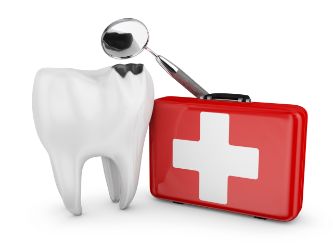
In the midst of the guidelines for self-isolation and “shelter in place” during the COVID-19 crisis, you may already know that elective dental procedures are postponed for at least the next several weeks. But what about dental emergencies? At this time, people are encouraged to avoid hospital emergency rooms whenever possible to keep from overwhelming healthcare facilities that are already strained. However, an emergency dentist is still available for assistance! Learn more below about what to do in a dental emergency during this time.
How Should You Handle a Dental Emergency During COVID-19?
Though it may be challenging, do your best to stay calm. Then call an emergency dentist to get specific advice for your situation and possibly schedule an appointment for treatment.
While they can generally handle most types of dental emergencies, they’ll decide whether medical attention is needed on a case-by-case basis. Here are some examples that may require care at a hospital or urgent care center:
- A broken or dislocated jaw
- Facial trauma such as severe cuts that need sutures
- Moderate or heavy bleeding that won’t stop, even after applying pressure for 15 minutes
Tips To Alleviate Pain at Home
Addressing pain will help you stay comfortable, but remember to follow any advice you get from a dentist. That said, here are some tips for common emergencies to manage pain until your appointment:
- Knocked-out tooth – Being careful to handle the tooth by the crown, not the root, start with a quick rinse and then try putting it back in its socket (only for adults). If that’s not possible, put it in a glass of milk or hold it in your cheek pouch. You must keep the tooth moist, but only use tap water as a last resort as it can damage the tooth. Apply pressure with a clean piece of cloth or gauze to slow any bleeding until your visit.
- A chipped or broken tooth – Chew on the opposite side and cover any sharp edges with dental wax from the drugstore. For pain, use an over-the-counter pain medication as directed.
- Toothache – A severe toothache, especially if it’s accompanied by any swelling, is often a sign of a serious infection. Start by swishing with lukewarm saltwater to cleanse the mouth. For pain, take an antibiotic and over-the-counter pain medication as directed.
A dental emergency rarely happens at a good time, and that’s never been more true than during the COVID-19 crisis. By calling an emergency dentist and managing things at home as much as possible, you’ll have a better chance of avoiding a trip to the emergency room. That will not only save precious resources, but also lower your own risk of exposure to the virus.
About the Author
Dr. Darren Koch is a general and emergency dentist with decades of experience. As a dedicated healthcare provider, he’s committed to caring for his patients during COVID-19 and helping them avoid unnecessary trips to the hospital. If you’re having a dental emergency or have any questions, he can be reached via his website.






